Man 'owes everything' to fire crews who saved home
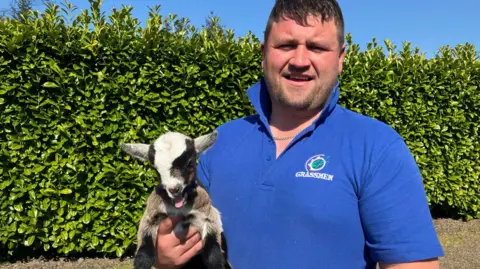 BBC
BBCA man whose house, pets, and farm animals were put at serious risk by a deliberate wildfire has said he "owes everything" to firefighters who saved his home.
Padraig McMahon got a phone call on Tuesday to tell him the blaze on a mountain outside Ballygawley, County Tyrone, was rapidly spreading towards his property.
"There was the space of an hour at one time yesterday evening when we actually thought the house was gone," he told BBC News NI.
The blaze was one more than 200 wildfires in Northern Ireland in recent days - most of which firefighters have said were started deliberately.
'It was just mayhem'
Mr McMahon was working as a lorry driver in County Louth and his wife was working in Antrim when their neighbour called to alert them to the blaze.
He said they were told firefighters "wanted our animals out of here and they were getting it tight to save our house".
Mr McMahon rushed home and started moving the couple's seven horses, their goats, and pet cats out of danger as fire crews tried to protect their property.
"You could see the flames, probably the height of the trees," he said.
"But when we were out there, there was that much smoke I was floating – I didn't know what was happening really."
The couple, who moved into the house six months ago, had to ask their neighbours if they could move their animals into surrounding fields.
"We had goats in boots of cars, and cats - it was just mayhem," he said.
Mr McMahon said the flames ran around the whole perimeter of his house.
"It was the firemen that saved it, they controlled the fire away from here. You can actually see the area where they dampened that it didn't come in.
"I owe them everything today," he added.
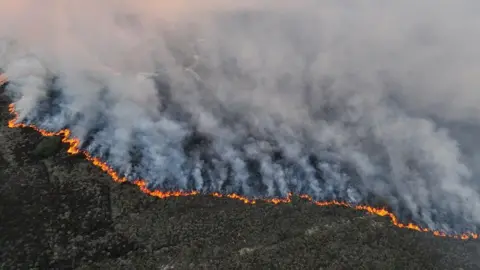 Martin McKenna
Martin McKennaForty fire personnel and 29 fire appliances were deployed to the scene of the fire near the Millix Road, north of Ballygawley.
The operation was later scaled back according to David Harbinson, Area Commander with the Northern Ireland Fire and Rescue Service (NIFRS).
He told the BBC's Evening Extra programme that 30 personnel were still at the scene on Wednesday evening but they hoped to leave by nightfall.
Elsewhere on Wednesday, fire crews were called out to gorse fires at Fintona, County Tyrone and Cargan, County Antrim.
The Fintona fire was reported at Eccelsville Road at about 16:50 BST and spread to approximately two acres, according to NIFRS.
Five fire appliances and 38 firefighters were deployed to the scene.
The gorse fire at Glenravel Road, Cargan, was reported at17:23 BST and 41 firefighters were in attendance.
Both fires have been extinguished.
'Working round the clock'
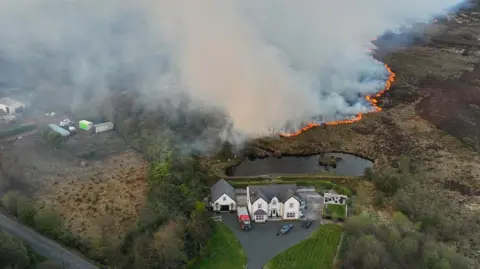 Martin McKenna
Martin McKennaMr Harbinson told Evening Extra it has been a "very challenging" few days for NIFRS which has received more than 1,600 calls since last Thursday.
He explained many of those will be repeat calls about the same blaze, but they have responded to almost 900 incidents, more than 200 of which have been wildfires.
"We have a lot of people in the service at the minute who are quite tired, working round the clock, but we're all working to support each other," he said.
Between Thursday and Tuesday, crews tackled large blazes in areas including the Mourne Mountains, Belfast, Newry and the Ballygawley fire.
There have been 147 fires across the Mournes since Thursday night which have ravaged the landscape at Slieve Bearnagh, Slieve Binnian and Bloody Bridge.
They were all brought under control, but walkers are being advised to avoid the area until further notice.
Divis and Black Mountain fires
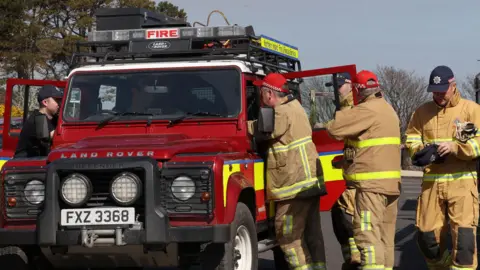 PA Media
PA MediaA gorse fire reported on Divis and Black Mountain in Belfast on Tuesday evening was among those believed to have been started deliberately.
Twenty-six firefighters tackled the blaze.
What is the law about fires in Northern Ireland?
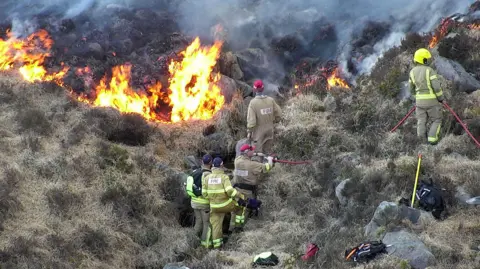 PA Media
PA MediaEarlier in the week, Sinn Féin MP for South Down Chris Hazzard called for a review of the law relating to burning in Northern Ireland.
The law states that burning of vegetation such as heather, gorse (whin) or fern may only be carried out between 1 September and 14 April.
Before any prescribed burning in Northern Ireland, those involved are advised to alert NIFRS headquarters to discuss the details.
People who manage land may burn gorse in a controlled manner to clear land for other purposes, and burn heather to encourage new shoots that are more palatable to game birds.
But this month's high temperatures and long dry spell have led to good conditions for wildfires to spread.
From 2020 to 2024, there were no prosecutions at courts for the offence "burning whins in closed season", but the setting of gorse fires more generally can be prosecuted as arson.
The Department of Justice does not keep records on the circumstances of arson prosecutions, for example whether someone was prosecuted for arson because they lit a gorse fire.
In the Republic of Ireland, for comparison, the law states growing vegetation cannot be burnt between 1 March and 31 August of any given year.
The controlled burning of lands is allowed in certain circumstance between 1 September and 28 February.
Gardaí (police) and the fire service must be consulted before any burning.
